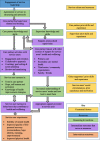Refining a model of collaborative care for people with a diagnosis of bipolar, schizophrenia or other psychoses in England: a qualitative formative evaluation
- PMID: 30616552
- PMCID: PMC6323712
- DOI: 10.1186/s12888-018-1997-z
Refining a model of collaborative care for people with a diagnosis of bipolar, schizophrenia or other psychoses in England: a qualitative formative evaluation
Abstract
Background: Many people diagnosed with schizophrenia, bipolar or other psychoses in England receive the majority of their healthcare from primary care. Primary care practitioners may not be well equipped to meet their needs and there is often poor communication with secondary care. Collaborative care is a promising alternative model but has not been trialled specifically with this service user group in England. Collaborative care for other mental health conditions has not been widely implemented despite evidence of its effectiveness. We carried out a formative evaluation of the PARTNERS model of collaborative care, with the aim of establishing barriers and facilitators to delivery, identifying implementation support requirements and testing the initial programme theory.
Methods: The PARTNERS intervention was delivered on a small scale in three sites. Qualitative data was collected from primary and secondary care practitioners, service users and family carers, using semi-structured interviews, session recordings and tape-assisted recall. Deductive and inductive thematic analysis was carried out; themes were compared to the programme theory and used to inform an implementation support strategy.
Results: Key components of the intervention that were not consistently delivered as intended were: interaction with primary care teams, the use of coaching, and supervision. Barriers and facilitators identified were related to service commitment, care partner skills, supervisor understanding and service user motivation. An implementation support strategy was developed, with researcher facilitation of communication and supervision and additional training for practitioners. Some components of the intervention were not experienced as intended; this appeared to reflect difficulties with operationalising the intervention. Analysis of data relating to the intended outcomes of the intervention indicated that the mechanisms proposed in the programme theory had operated as expected.
Conclusions: Additional implementation support is likely to be required for the PARTNERS model to be delivered; the effectiveness of such support may be affected by practitioner and service user readiness to change. There is also a need to test the programme theory more fully. These issues will be addressed in the process evaluation of our full trial.
Trial registration: ISRCTN95702682 , 26 October 2017.
Keywords: Bipolar; Collaborative care; Feasibility studies; Formative evaluation; Psychosis; Recovery; Schizophrenia.
Conflict of interest statement
Authors’ information
EB is trained as a clinical psychologist and received her Clin.Psy.D. from the University of Birmingham. She is currently working as a research fellow on the process evaluation of the PARTNERS2 trial. Her clinical and research interests include recovery-based practice, especially as applied to psychosis.
NB is Professor of Applied Health Care Research at the University of Exeter College of Medicine and Health. She has a PhD in medical sociology and is an experienced qualitative researcher. Her research interests include patient-practitioner communication about medicines.
MC received a Bsc. (Hons) in Psychology from Lancaster University. She has received post graduate qualifications in Mental Health Research and Primary Care Mental Health Practice. She worked as a research associate on the PARTNERS2 project and has also worked within the NHS in both primary care and secondary care settings.
LGa trained in psychiatry at the University of Manchester, where she received her PhD, and is currently Emerita Professor of Primary Care Psychiatry. Her research interests are improving the quality of care for people with mental health problems in the setting of primary care, the management of depression and mental health communication skills. She also has personal experience of mental health problems.
LGi received an MSc in Social Research from the University of Plymouth. She worked on the Partners2 project as a Service User Research Assistant, bringing lived experience to the role. She also runs a voluntary help group for those with mild to moderate mental health problems.
RGJ received her PhD in Education from the University of Exeter and worked on the PARTNERS2 project as a research fellow. She is a qualitative researcher interested by participatory research, reviews and realist approaches. Her interests include disability, stigma and marginalisation, how these interact with identity and the social model of disability.
CMc received her Masters in Sociology from Simon Fraser University and worked on the PARTNERS2 project as a research assistant. Her research interests include mental health, sexuality and virtual spaces.
SR is Senior Lecturer in Health Research at the Lancaster University. Her research interests are improving the quality of care and evidence base for the delivery of health and social care services for people living with severe mental illness and people living with dementia.
AR received her DPhil in Public Health from the University of Oxford and worked as a research associate on the PARTNERS2 project. She is interested in using mixed methods to evaluate and develop health and social policy in relation to individuals from vulnerable communities.
Ethics approval and consent to participate
Ethical approval was obtained from the West Midlands – Edgbaston Ethics Committee (REC number 14/WM/0052). All participants provided written informed consent before taking part in this study.
Consent for publication
Not applicable.
Competing interests
The authors declare that they have no competing interests.
Publisher’s Note
Springer Nature remains neutral with regard to jurisdictional claims in published maps and institutional affiliations.
Figures
References
-
- Bindman J, Johnson S, Wright S, et al. Integration between primary and secondary services in the care of the severely mentally ill: patients’ and general practitioners’ views. Br J Psychiatr. 1997. 10.1192/bjp.171.2.169. - PubMed
Publication types
MeSH terms
Associated data
Grants and funding
LinkOut - more resources
Full Text Sources
Medical


